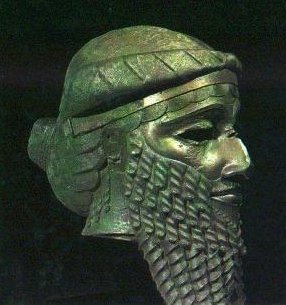
Sargon of Akkad (c. 2334-2279 B.C.)
Sargon Of Akkad - flourished 23rd century BC -
ancient Mesopotamian ruler (reigned c. 2334-2279 BC), one of the earliest of the world's great empire builders, conquering all of southern Mesopotamia as well as parts of Syria, Anatolia, and Elam (western Iran). He established the region's first Semitic dynasty and was considered the founder of the Mesopotamian military tradition. 
Life.
Sargon is known almost entirely from the legends and tales that followed his reputation through 2,000 years of cuneiform Mesopotamian history, and not from documents that were written during his lifetime. The lack of contemporary record is explained by the fact that the capital city of Agade, which he built, has never been located and excavated. It was destroyed at the end of the dynasty that Sargon founded and was never again inhabited, at least under the name of Agade.
According to a folktale, Sargon was a self-made man of humble origins; a gardener, having found him as a baby floating in a basket on the river, brought him up in his own calling. His father is unknown; his own name during his childhood is also unknown; his mother is said to have been a priestess in a town on the middle Euphrates. Rising, therefore, without the help of influential relations, he attained the post of cupbearer to the ruler of the city of Kish, in the north of the ancient land of Sumer. The event that brought him to supremacy was the defeat of Lugalzaggisi of Uruk (biblical Erech, in central Sumer). Lugalzaggisi had already united the city-states of Sumer by defeating each in turn and claimed to rule the lands not only of the Sumerian city-states but also those as far west as the Mediterranean. Thus, Sargon became king over all of southern Mesopotamia, the first great ruler for whom, rather than Sumerian, the Semitic tongue known as Akkadian was natural from birth, although some earlier kings with Semitic names are recorded in the Sumerian king list. Victory was ensured, however, only by numerous battles, since each city hoped to regain its independence from Lugalzaggisi without submitting to the new overlord. It may have been before these exploits, when he was gathering followers and an army, that Sargon named himself Sharru-kin ("Rightful King") in support of an accession not achieved in an old-established city through hereditary succession. Historical records are still so meagre, however, that there is a complete gap in information relating to this period.
Not content with dominating this area, his wish to secure favourable trade with Agade throughout the known world, together with an energetic temperament, led Sargon to defeat cities along the middle Euphrates to northern Syria and the silver-rich mountains of southern Anatolia. He also dominated Susa, capital city of the Elamites, in the Zagros Mountains of western Iran, where the only truly contemporary record of his reign has been uncovered. Such was his fame that some merchants in an Anatolian city, probably in central Turkey, begged him to intervene in a local quarrel, and, according to the legend, Sargon, with a band of warriors, made a fabulous journey to the still-unlocated city of Burushanda (Purshahanda), at the end of which little more than his appearance was needed to settle the dispute.
As the result of Sargon's military prowess and ability to organize, as well as of the legacy of the Sumerian city-states that he had inherited by conquest and of previously existing trade of the old Sumerian city-states with other countries, commercial connections flourished with the Indus Valley, the coast of Oman, the islands and shores of the Persian Gulf, the lapis lazuli mines of Badakhshan, the cedars of Lebanon, the silver-rich Taurus Mountains, Cappadocia, Crete, and perhaps even Greece.
During Sargon's rule Akkadian became adapted to the script that previously had been used in the Sumerian language, and the new spirit of calligraphy that is visible upon the clay tablets of this dynasty is also clearly seen on contemporary cylinder seals, with their beautifully arranged and executed scenes of mythology and festive life. Even if this new artistic feeling is not necessarily to be attributed directly to the personal influence of Sargon, it shows that, in his new capital, military and economic values were not alone important.
Because contemporary record is lacking, no sequence can be given for the events of his reign. Neither the number of years during which he lived nor the point in time at which he ruled can be fixed exactly; 2334 BC is now given as a date on which to hang the beginning of the dynasty of Agade, and, according to the Sumerian king list, he was king for 56 years.
The latter part of his reign was troubled with rebellions, which later literature ascribes, predictably enough, to sacrilegious acts that he is supposed to have committed; but this can be discounted as the standard cause assigned to all disasters by Sumerians and Akkadians alike. The troubles, in fact, were probably caused by the inability of one man, however energetic, to control so vast an empire without a developed and well-tried administration. There is no evidence to suggest that he was particularly harsh, nor that the Sumerians disliked him for being a Semite. The empire did not collapse totally, for Sargon's successors were able to control their legacy, and later generations thought of him as being perhaps the greatest name in their history.
Assessment.
Attributing his success to the patronage of the goddess Ishtar, in whose honour Agade was erected, Sargon of Akkad became the first great empire builder. Two later Assyrian kings were named in his honour. Although the briefly recorded information of his predecessor Lugalzaggisi shows that expansion beyond the Sumerian homeland had already begun, later Mesopotamians looked to Sargon as the founder of the military tradition that runs through the history of their people. (Encyclopaedia Britannica Article)
Stephanie Mary Dalley